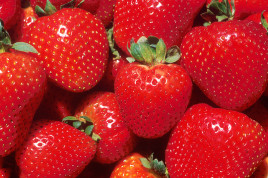East Anglia University reports: Eating three or more servings of strawberries and blueberries per week may help women reduce their risk of a heart attack by one-third – according to research from the University of East Anglia in collaboration with the Harvard School of Public Health.
These berries contain high levels of powerful bioactive compounds called anthocyanins, which are a sub-group of dietary flavonoids.
Research published yesterday in Circulation: Journal of the American Heart Association shows that these anthocyanins may help dilate arteries, counter the build-up of plaque and provide other cardiovascular benefits.
Scientists from UEA’s Norwich Medical School and Harvard School of Public Health (US) studied 93,600 women aged between 25 and 42 who were registered with the Nurses’ Health Study II. The women completed questionnaires about their diet every four years for 18 years.
During the study, 405 heart attacks occurred. Women who ate the most blueberries and strawberries had a 32 per cent reduction in their risk of having a heart attack compared to women who ate the berries once a month or less – even in women who otherwise ate a diet rich in other fruits and vegetables.
The study was lead by Prof Aedín Cassidy – head of the Department of Nutrition at UEA. She said: “We have shown that even at an early age, eating more of these fruits may reduce risk of a heart attack later in life. This is the first study to look at the impact of diet in younger and middle-aged women.
“Blueberries and strawberries contain high levels of compounds that have cardiovascular benefits, and our study shows that women who ate at least three servings per week had fewer heart attacks.
“The findings were independent of other risk factors, such as age, high blood pressure, family history of heart attack, body mass, exercise, smoking,caffeine or alcohol intake.
“Blueberries and strawberries were part of this analysis because they are the most-eaten berries in the United States. It is possible that other fruit and vegetables could produce the same results.”
Senior author and associate professor of nutrition and epidemiology at Harvard, Eric Rimm, added: “Blueberries and strawberries can easily be incorporated into what women eat every week. This simple dietary change could have a significant impact on prevention efforts.”
Until more information about specific dietary constituents like flavonoids is available and fully understood, the American Heart Association recommends eating a balanced diet containing a wide variety of fruits, vegetables and whole-grain products. Eating a variety of foods is the best way to get the right amounts of nutrients.
The study was funded by the National Institutes of Health and the Biotechnology and Biological Sciences Research Council.
Co-authors are Kenneth J. Mukamal M.D.; Lydia Liu M.Sc.; Mary Franz M.Sc.; A. Heather Eliassen Sc.D.; and Eric B. Rimm Sc.D.
Tags: healthy eating


Subscribe with…